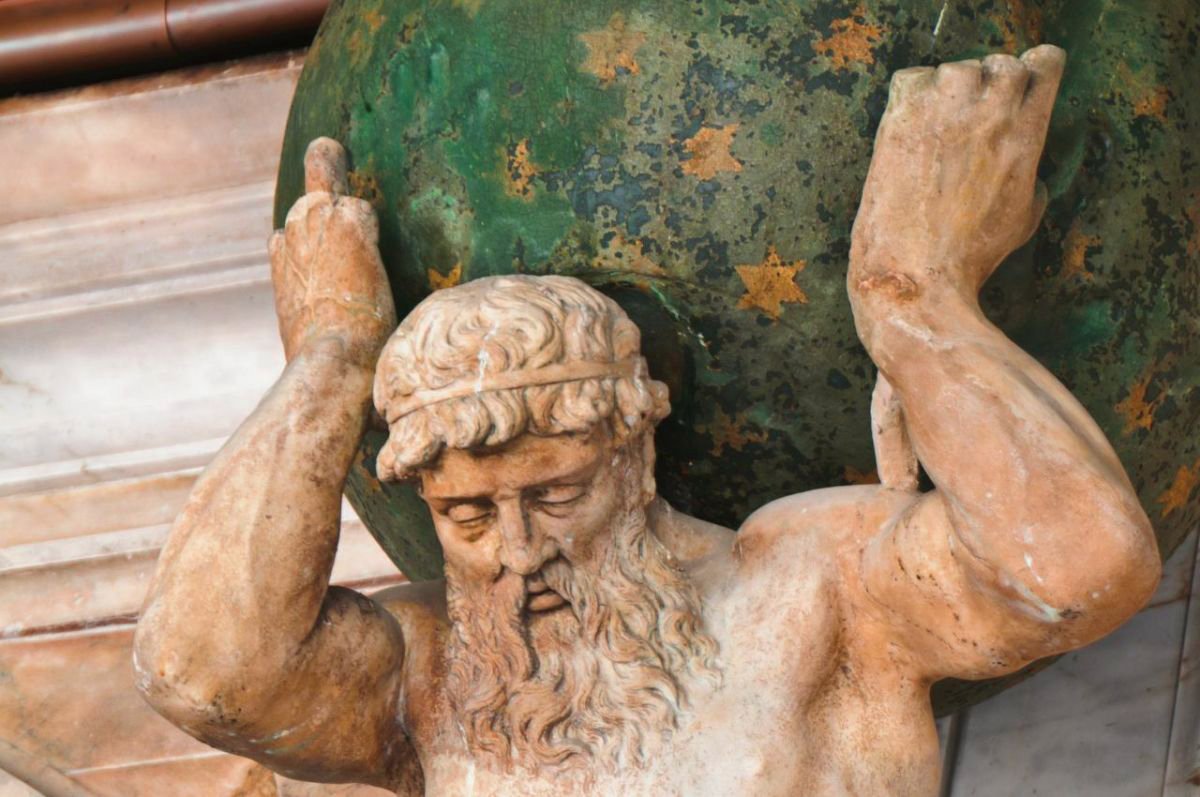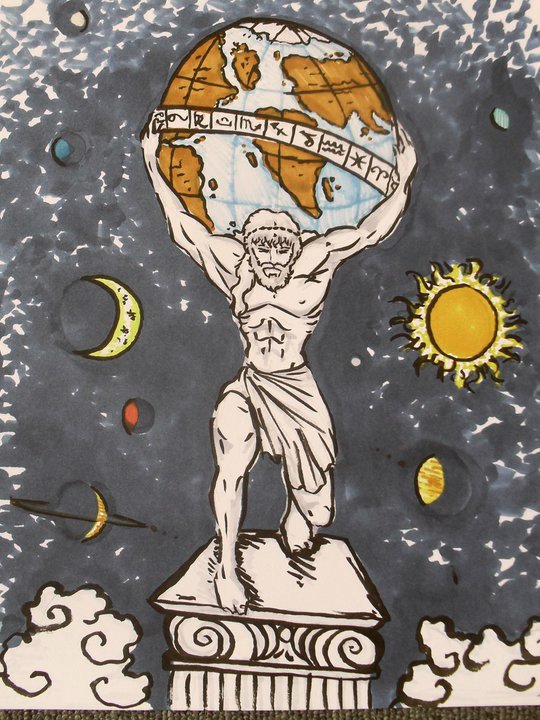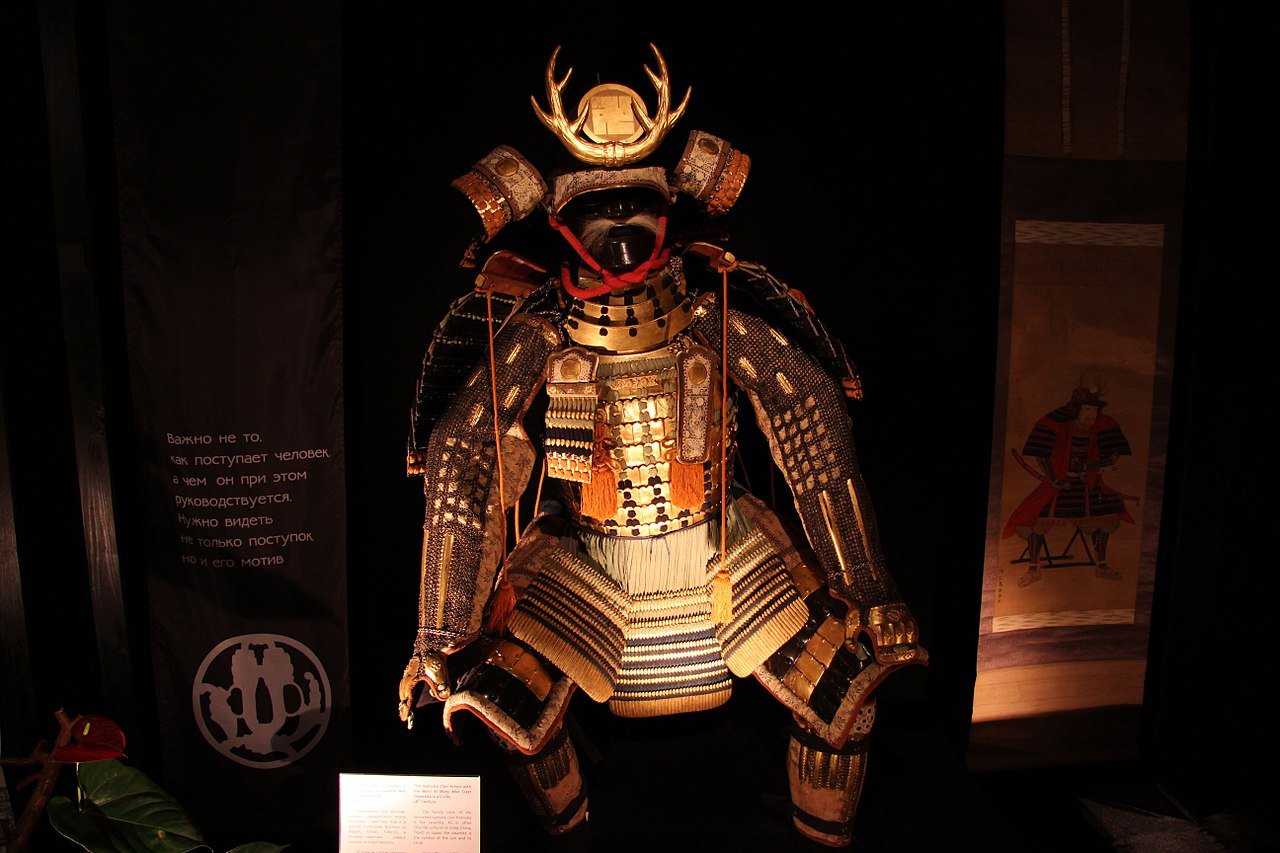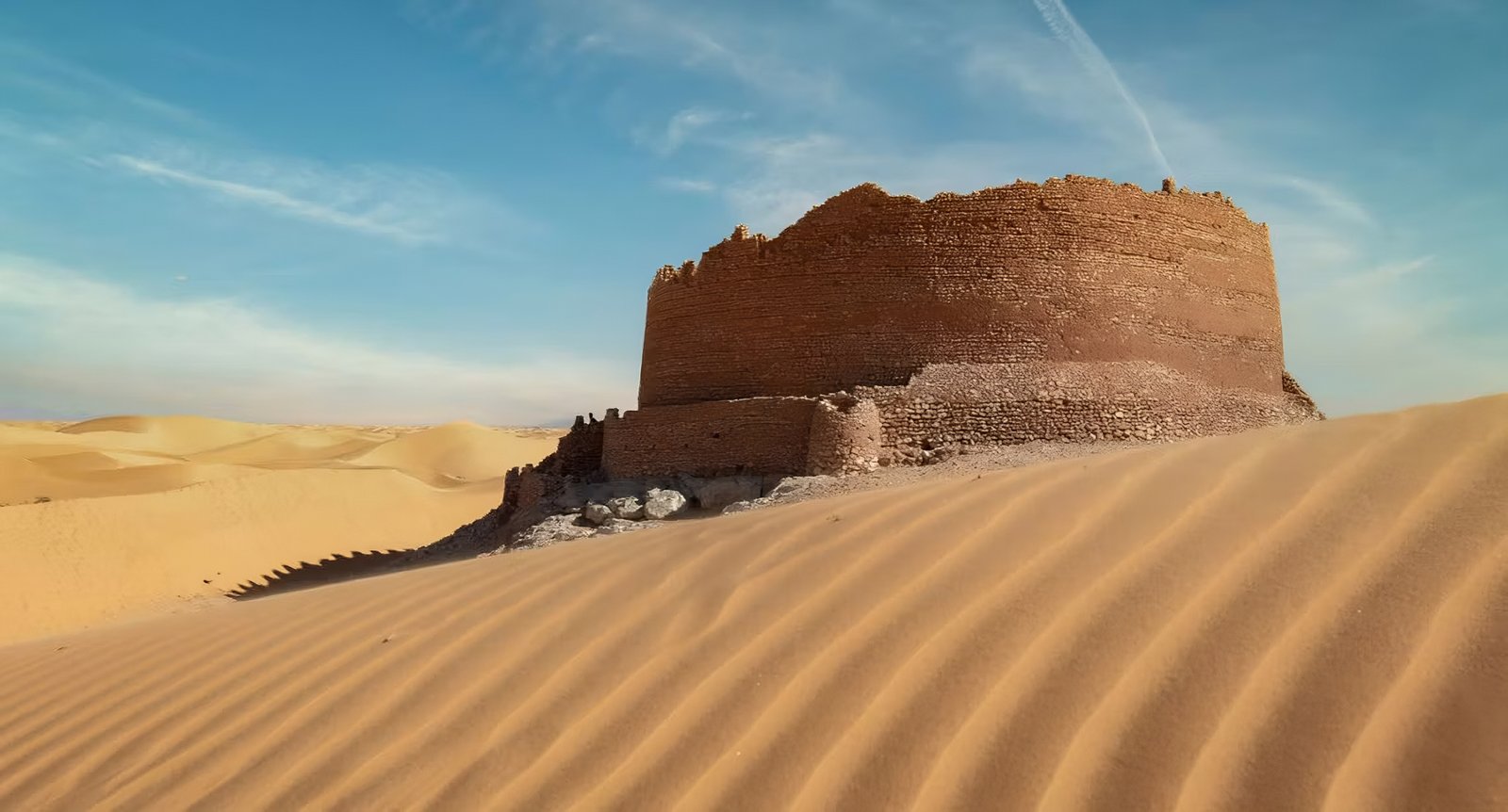Introduction
What is Atlas in Greek Mythology?
In the realm of Greek mythology, Atlas stands as a formidable figure, renowned for his immense strength and enduring burden. He is the Titan tasked with upholding the celestial sphere, the heavens themselves, for eternity. Zeus, the top god, gave Atlas this penalty. It was because Atlas was part of the Titanomachy, an epic battle with the Titans and the Olympians.
The tale of Atlas is a moving lesson about what happens when you rebel, and how strong the gods are. His picture, showing a tired giant holding up the world, is now a symbol of staying strong, not giving up, and accepting reality.
Significance of Atlas in Greek Mythology
Atlas in Greek Mythology holds a prominent position within Greek mythology, not merely as a Titan condemned to an arduous task. He is also associated with astronomy, navigation, and the knowledge of the heavens. His name, Atlas, has been adopted to refer to collections of maps, reflecting his connection to the celestial realm.
Atlas’s tale is famous in many cultures and art forms. Sculptures, paintings, and literature have all captured him, his image sparking interest and feeling. His story cautions us about extreme pride and the sureness of divine consequences.

Atlas of Greek Mythology
Origins and Genealogy
Atlas in Greek Mythology belonged to the second generation of Titans, born from the union of the Titan Iapetus and the Oceanid Clymene or Asia. His siblings included Prometheus, the cunning Titan who stole fire from the gods, and Epimetheus, the Titan who received the first woman, Pandora, from Zeus.
Atlas as a Titan
The Titans were a powerful race of primordial beings who ruled the earth before the rise of the Olympians. They were known for their immense strength and longevity, though they were ultimately overthrown by Zeus and his Olympian siblings.
Atlas, as a Titan, possessed extraordinary physical abilities and an extended lifespan. He was said to be of immense size and strength, capable of bearing the weight of the entire sky upon his shoulders.

The Role of Atlas in Greek Mythology
Atlas in Greek Mythology and the Titanomachy
Atlas in Greek Mythology was a key figure in the Titanomachy, the clash between the Titans and the Olympians. He joined his Titan buddies in a bid to take back their power from Zeus and the Olympians. This aimed to revisit their past glory.
However, the Olympians emerged victorious, led by the powerful Zeus. As punishment for their rebellion, the Titans were cast into the depths of Tartarus, the primordial prison, except for Atlas.
Atlas and the Punishment of Holding the Sky
Atlas in Greek Mythology, unlike his fellow Titans, was spared from Tartarus but faced a different form of punishment. He was condemned to hold up the celestial sphere, the heavens themselves, for eternity. This arduous task served as a constant reminder of the Titans’ defeat and the supremacy of Zeus.
Atlas’s punishment is often depicted in art and literature, with his weary figure bearing the weight of the world upon his shoulders. He is a symbol of resilience, endurance, and the inescapable nature of fate.
Who is Atlas in Greek Mythology?
Attributes and Characteristics
Atlas in Greek Mythology was known for his immense strength, his ability to withstand tremendous burdens, and his unwavering obedience to Zeus’s command. Despite his punishment, he never rebelled or attempted to escape his duty.
He was also associated with astronomy, navigation, and the knowledge of the heavens. His name, Atlas, has been adopted to refer to collections of maps, reflecting his connection to the celestial realm.
Atlas in Art and Literature
Atlas’s image has been immortalized in various forms of art and literature. Sculptors have depicted him as a weary giant bearing the weight of the sky, while painters have captured his strength and resilience in their works.
In literature, Atlas is often portrayed as a tragic figure, condemned to an eternal burden yet possessing an unwavering sense of duty. His story serves as a cautionary tale about the consequences of hubris and the power of the gods.
The Story of Atlas in Greek Mythology
The Titan’s Early Life
Atlas in Greek Mythology was born to the Titan Iapetus and the OceanidClymene. He was a formidable figure from birth, possessing immense strength and a rebellious spirit. Atlas grew up among his Titan kin, learning the ways of the world and the secrets of the heavens.
Atlas and Heracles
Atlas’s story is particularly intertwined with the myth of Heracles, the Greek hero known for his twelve labors. In one of his labors, Heracles was tasked by King Eurystheus to retrieve the golden apples of the Hesperides, daughters of Atlas.
Atlas, initially hesitant to assist Heracles, agreed to retrieve the apples for him. However, he was also tempted to take the apples for himself, believing that their power would make him invincible.
Heracles, recognizing Atlas’s intentions, came up with a plan. He offered to help Atlas hold up the sky for a moment, allowing Atlas to rest from his eternal burden. Atlas, intrigued by the prospect, agreed to Heracles’s proposal.
Atlas in Tattoos and Art
Atlas Greek Mythology Tattoo Designs
Atlas has become a popular motif in tattoo art, often symbolizing strength, endurance, and the ability to overcome challenges. Atlas tattoos often depict him bearing the weight of the sky, his figure representing the burdens that we carry in our lives.
Symbolism of Atlas Tattoos
Atlas tattoos can carry a variety of meanings, depending on the individual’s interpretation. Some common interpretations include:
Strength and endurance: Atlas’s ability to bear the weight of the sky for eternity symbolizes the power to persevere through difficult situations.
Overcoming challenges: The story of Atlas and Heracles can be seen as a metaphor for overcoming obstacles and achieving our goals.
Responsibility and duty: Atlas’s punishment serves as a reminder of the importance of fulfilling our obligations and responsibilities.
Connection to the heavens: Atlas’s association with astronomy and the celestial realm can symbolize a connection to spirituality and a higher power.
Rhea or Atlas in Greek Mythology
Rhea: A Titaness in Greek Mythology
Rhea, a Titaness, was both companion and spouse to Cronus, who led the Titans. She gave birth to numerous Olympians like Zeus, Hera, Poseidon, Demeter, and Hades. Rhea is usually shown as a caring and safeguarding mom. Her significant contribution enabled the shift from the rule of the Titans to the period of the Olympians.
Any Connection between Rhea and Atlas?
Rhea and Atlas were both Titans, but there is no direct connection between them in Greek mythology. Rhea was the sister of Atlas’s father, Iapetus, making them distant relatives. However, there are no myths or stories that specifically link Rhea and Atlas together.
Atlas Drawings and Depictions
Historical Atlas Art
Atlas in Greek Mythology has been depicted in various forms of art throughout history. In ancient Greek art, he is often portrayed as a muscular figure holding up the celestial sphere. Roman artists also incorporated Atlas into their works, often using him as a symbol of strength and endurance.
Contemporary Atlas Illustrations
Atlas in Greek Mythology continues to be a popular subject in contemporary art. Modern artists have reimagined Atlas in various styles and mediums, exploring the symbolism of his story and the weight he bears.
Atlas Greek Mythology Story Analysis
Themes and Morals
The Greek myth of Atlas is packed with many lessons and values. It teaches us about the risks of excessive pride, the hazards of defying divine entities, and the certain outcome of destiny. Moreover, it highlights the strength of persistence and the skill to withstand tough trials.
Impact on Greek Mythology
Atlas’s tale is a vital part of Greek tales, reminding us of divine might and rebel outcomes. His picture and symbols appear broadly in art, books, and society, making him a well-known Greek myth figure.
Who Was Atlas in Greek Mythology?
Ancestry and Family Ties
Chart book was the child of the Titan Iapetus and the OceanidClymene. He had several siblings, including Prometheus, Epimetheus, Menoetius, and Themis. Atlas was also the father of many daughters, including the Hesperides, the Hyades, the Pleiades, and the nymph Calypso.
Atlas’s Legacy in Mythology
Atlas’s legacy in Greek mythology is one of strength, endurance, and the consequences of rebellion. His image continues to be used as a symbol of perseverance and the power to overcome challenges.
Atlas in Greek Mythology Symbolism
Understanding the Symbol of Atlas
Atlas’s image as a figure bearing the weight of the sky has become a powerful symbol with various interpretations. It can represent:
Strength and endurance: Atlas’s ability to carry the weight of the sky symbolizes the power to persevere through difficult situations.
Responsibility and duty: Atlas’s punishment serves as a reminder of the importance of fulfilling our obligations and responsibilities.
The burdens we carry: Atlas’s story can be seen as a metaphor for the weight of our own responsibilities, challenges, and personal struggles.
The connection to the universe: Atlas’s association with astronomy and the celestial realm can symbolize a connection to spirituality and a higher power.
Interpretations in Different Contexts
The symbolism of Atlas can vary depending on the context. In art, he may represent the creative burden of the artist or the weight of human existence. In literature, he may symbolize the weight of history or the burden of knowledge.
Atlas in the Greek Mythological Narrative
Connections with Other Greek Gods and Titans
Atlas hung around with big names from Greek myths. He took part in the Titanomachy – it was a fight between Titans and Olympians. Atlas also had a role in the Heracles story – this guy was a famous Greek hero.
Influence on Greek Mythological Cycles
Atlas’s story is interwoven with several other Greek myths. His punishment as the sky-bearer is a consequence of the Titanomachy, and his encounter with Heracles forms part of the hero’s twelve labors.
Conclusion
In wrapping up, Atlas in Greek Mythology is a significant character in Greek myths. He showcases power, stamina, and the result of refusal. His tale has echoed over time, stimulating artists, authors and brainiacs to dig deep into people’s essence and our bond to the universe.
FAQS
Who is Atlas in Greek mythology?
Atlas was a Titan from Greek mythology who was condemned to carry the heavens on his shoulders for all of eternity. He was a powerful figure known for his immense strength and resilience.
Why was Atlas in Greek Mythology punished?
Atlas got in trouble with Zeus, the top god, because he chose to support the Titans in their fight against the Olympians, called the Titanomachy. When the Titans lost, Atlas was forced to carry the sky. This was punishment and a reminder for his defiance.
What is Atlas’s connection to astronomy?
Atlas was associated with astronomy and navigation due to his role as the sky-bearer. He was said to possess knowledge of the heavens and the movements of the stars.
What is the symbolism of Atlas in Greek Mythology?
Atlas signifies strength, perseverance, and life’s heavy loads. His tale can likewise be seen as a warning of pride’s penalties and the gods’ might.






